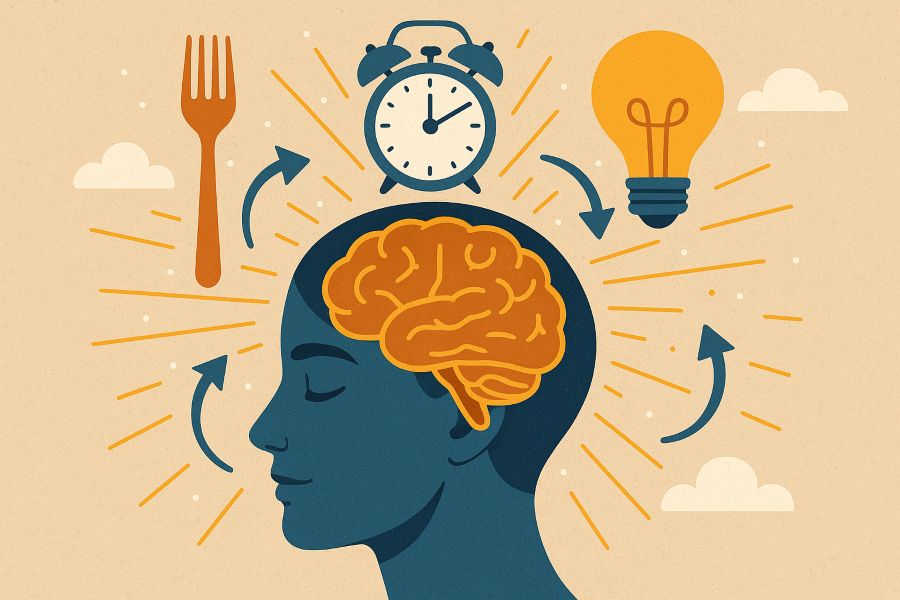Have you ever felt like your mind is clouded with distractions, unable to zero in on what truly matters? In today’s fast-paced world, mental clarity is a rare and precious commodity. Enter fasting—a practice that’s been around for centuries, not just for physical health but for sharpening the mind. When we talk about fasting focus, we’re diving into how abstaining from food for specific periods can help clear mental fog, boost concentration, and even improve emotional resilience. Whether you’re new to fasting or a seasoned practitioner, this post will unpack the science, benefits, and practical ways to harness fasting for a clearer, more focused mind. Let’s explore how fasting focus can be your secret weapon for mental sharpness.
What Is Fasting Focus and Why Does It Matter?
At its core, fasting focus refers to the heightened mental clarity and concentration that many people experience during fasting. This isn’t just anecdotal—there’s growing evidence that fasting can positively impact brain function. When you fast, your body shifts into a state of ketosis, where it burns fat for fuel instead of glucose. This metabolic switch doesn’t just affect your body; it has profound effects on your brain, potentially enhancing cognitive performance (Mattson et al., 2018). Fasting focus matters because mental clarity isn’t just about productivity—it’s about living with intention, making better decisions, and feeling more in control of your thoughts. In a world full of overstimulation, fasting offers a way to hit the reset button on your mind.
The Science Behind Fasting and Mental Clarity
Let’s dive into the nitty-gritty of how fasting focus works on a biological level. During fasting, your brain undergoes several changes that can enhance clarity and focus. One key player is brain-derived neurotrophic factor (BDNF), a protein that supports neuron growth and protects against cognitive decline. Studies show that intermittent fasting can increase BDNF levels, which may improve memory and learning (Mattson et al., 2018). Additionally, fasting reduces inflammation in the brain, a known contributor to mental fog and mood disorders (Burkhalter et al., 2020). Another fascinating aspect is how fasting triggers autophagy—a cellular cleanup process that removes damaged components, potentially sharpening cognitive function (Hansen et al., 2018). These mechanisms collectively contribute to the mental sharpness many report during a fast.
Beyond biology, fasting also lowers insulin levels, stabilizing blood sugar and preventing the energy crashes that disrupt focus. When your body isn’t constantly digesting food, it can redirect energy to other processes, including brain function. This is why many people describe feeling “lighter” and more alert during fasting periods. The science is clear: fasting focus isn’t just a buzzword—it’s a real, measurable phenomenon.
Benefits of Fasting Focus for Mental Well-Being
While the science is compelling, the real-world benefits of fasting focus are what make it so appealing. Here are some ways that fasting can transform your mental state:
- Improved Concentration: Without the constant spikes and dips in blood sugar, your brain can maintain steady energy levels, helping you stay on task.
- Reduced Stress: Fasting has been linked to lower cortisol levels, the stress hormone, which can calm an overactive mind (Fond et al., 2013).
- Enhanced Creativity: Many report that fasting clears mental clutter, opening space for innovative thinking and problem-solving.
- Better Emotional Regulation: A clearer mind often means better control over emotions, reducing reactivity in stressful situations.
These benefits aren’t just for productivity junkies—they’re for anyone looking to feel more grounded and present. Whether you’re tackling a big project or simply trying to be more mindful, fasting focus can help you get there.
Practical Tips to Maximize Fasting Focus
Ready to try fasting for mental clarity? It’s not just about skipping meals—there’s a strategy to it. Here are actionable tips to ensure you get the most out of your fasting focus journey:
- Start Small with Intermittent Fasting: If you’re new, try a 16:8 schedule—fast for 16 hours and eat within an 8-hour window. This eases your body into the process.
- Stay Hydrated: Dehydration can mimic mental fog, so drink plenty of water during fasting periods to keep your brain sharp.
- Avoid Overeating Post-Fast: Breaking a fast with heavy, sugary meals can undo the clarity you’ve gained. Opt for nutrient-dense foods like vegetables and lean protein.
- Time Your Tasks: Schedule demanding mental work during fasting windows when your focus is likely at its peak.
- Listen to Your Body: If fasting feels overwhelming, scale back. Mental clarity shouldn’t come at the cost of stress or fatigue.
Remember, fasting focus is personal. Experiment with different fasting styles—whether it’s intermittent fasting, a 24-hour fast, or even a longer water fast under medical supervision—to find what works best for your mind and lifestyle.
Common Challenges and How to Overcome Them
Let’s be real—fasting isn’t always a walk in the park, especially when you’re aiming for mental clarity. Hunger pangs, irritability, and low energy can sometimes derail your fasting focus. But don’t worry; these hurdles are manageable. For starters, hunger often peaks in the first few days of a fasting routine but tends to subside as your body adjusts (Johnstone, 2015). If irritability creeps in, try mindfulness practices like deep breathing to center yourself. Low energy can often be countered by ensuring you’re getting enough electrolytes—think a pinch of salt in your water or a sugar-free electrolyte drink. The key is patience; your brain and body need time to adapt to this new way of functioning.
Another challenge is social pressure. Eating is often a communal activity, and explaining why you’re fasting can feel awkward. Be upfront about your goals—whether it’s achieving fasting focus or improving overall health—and most people will respect your choice. If cravings hit hard, distract yourself with a mental task or a quick walk. Overcoming these challenges builds resilience, making each fast a little easier and your mental clarity a little sharper.
Who Should Be Cautious with Fasting for Mental Clarity?
While fasting focus offers incredible benefits for many, it’s not a one-size-fits-all solution. Certain groups should approach fasting with caution or avoid it altogether. Pregnant or breastfeeding women, for instance, have increased nutritional needs that fasting could compromise. People with a history of eating disorders should steer clear, as fasting might trigger unhealthy patterns (Treasure et al., 2020). Those with medical conditions like diabetes or low blood pressure should consult a healthcare provider before starting any fasting regimen, as it could affect blood sugar or energy levels. If you’re on medication, fasting might alter how your body processes it, so a doctor’s input is crucial. Always prioritize safety over the pursuit of mental clarity—there are other paths to focus if fasting isn’t right for you.
In wrapping up, fasting focus is more than a trend—it’s a powerful tool to unlock mental clarity and elevate your daily life. By understanding the science behind it, embracing the benefits, and applying practical strategies, you can transform how you think and feel. Whether you’re looking to boost productivity, reduce stress, or simply declutter your mind, fasting offers a unique pathway to sharper focus. Remember to start slow, listen to your body, and consult a professional if you’re unsure. Mental clarity is within reach, and with a bit of fasting focus, you might just discover a version of yourself that’s calmer, clearer, and ready to take on the world. What’s stopping you from giving it a try?
References
- Burkhalter, T. M., Hillman, C. H., & Cooke, M. B. (2020). The effect of fasting on inflammation and cognitive function. Journal of Nutritional Science, 9, e12. https://doi.org/10.1017/jns.2020.5
- Fond, G., Macgregor, A., Leboyer, M., & Michalsen, A. (2013). Fasting in mood disorders: Neurobiology and effectiveness. Psychiatry Research, 209(3), 253-258. https://doi.org/10.1016/j.psychres.2012.12.018
- Hansen, M., Rubinsztein, D. C., & Walker, D. W. (2018). Autophagy as a promoter of longevity and cognitive health. Nature Reviews Molecular Cell Biology, 19(9), 579-593. https://doi.org/10.1038/s41580-018-0041-8
- Johnstone, A. (2015). Fasting for weight loss: An effective strategy or latest dieting trend? International Journal of Obesity, 39(5), 727-733. https://doi.org/10.1038/ijo.2014.214
- Mattson, M. P., Moehl, K., Ghena, N., Schmaedick, M., & Cheng, A. (2018). Intermittent metabolic switching, neuroplasticity and brain health. Nature Reviews Neuroscience, 19(2), 63-80. https://doi.org/10.1038/nrn.2017.156
- Treasure, J., Duarte, T. A., & Schmidt, U. (2020). Eating disorders in the time of fasting: Risks and considerations. The Lancet Psychiatry, 7(4), 297-298. https://doi.org/10.1016/S2215-0366(20)30076-3






